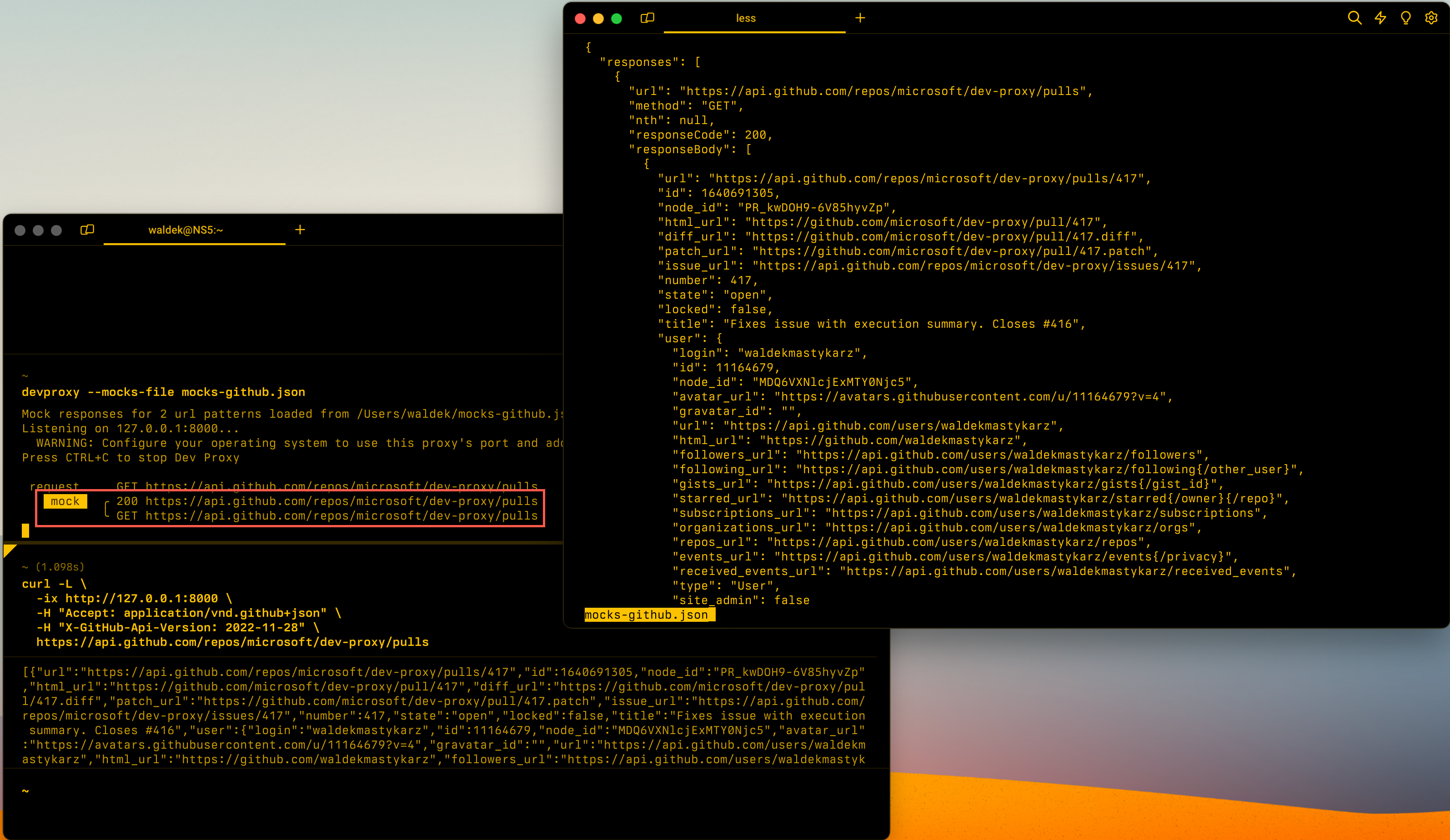MockResponsePlugin
Simulates responses.
Plugin instance definition
{
"name": "MockResponsePlugin",
"enabled": true,
"pluginPath": "~appFolder/plugins/dev-proxy-plugins.dll",
"configSection": "mocksPlugin"
}
Configuration example
{
"mocksPlugin": {
"mocksFile": "mocks.json"
}
}
Configuration properties
| Property | Description | Default |
|---|---|---|
mocksFile |
Path to the file containing mock responses | mocks.json |
blockUnmockedRequests |
Return 502 Bad Gateway response for requests that aren't mocked |
false |
Command line options
| Name | Description | Default |
|---|---|---|
-n, --no-mocks |
Disable loading mock requests | false |
--mocks-file |
Path to the file containing mock responses | - |
Mocks file examples
Following are examples of mock objects.
Respond with body
Response to a request with a 200 OK response and a JSON body.
{
"request": {
"url": "https://graph.microsoft.com/v1.0/me",
"method": "GET"
},
"response": {
"body": {
"@odata.context": "https://graph.microsoft.com/v1.0/$metadata#users/$entity",
"businessPhones": ["+1 412 555 0109"],
"displayName": "Megan Bowen",
"givenName": "Megan",
"jobTitle": "Auditor",
"mail": "MeganB@M365x214355.onmicrosoft.com",
"mobilePhone": null,
"officeLocation": "12/1110",
"preferredLanguage": "en-US",
"surname": "Bowen",
"userPrincipalName": "MeganB@M365x214355.onmicrosoft.com",
"id": "48d31887-5fad-4d73-a9f5-3c356e68a038"
},
"headers": [
{
"name": "content-type",
"value": "application/json; odata.metadata=minimal"
}
]
}
}
Respond with error
Respond to a request with a 404 Not Found response.
{
"request": {
"url": "https://graph.microsoft.com/v1.0/me/photo",
"method": "GET"
},
"response": {
"statusCode": 404
}
}
Respond with binary data
Respond to a request with a binary image loaded from a file on disk.
{
"request": {
"url": "https://graph.microsoft.com/v1.0/users/*/photo/$value",
"method": "GET"
},
"response": {
"body": "@picture.jpg",
"headers": [
{
"name": "content-type",
"value": "image/jpeg"
}
]
}
}
Respond on nth request
Respond to a request only after the second time it's called.
{
"request": {
"url": "https://graph.microsoft.com/v1.0/external/connections/*/operations/*",
"method": "GET",
"nth": 2
},
"response": {
"statusCode": 200,
"body": {
"id": "1.neu.0278337E599FC8DBF5607ED12CF463E4.6410CCF8F6DB8758539FB58EB56BF8DC",
"status": "completed",
"error": null
}
}
}
Respond matching the request body
Respond to a request that contains a specific string in the body.
{
"request": {
"url": "https://login.microsoftonline.com/fa15d692-e9c7-4460-a743-29f29522229/oauth2/v2.0/token",
"method": "POST",
"bodyFragment": "scope=https%3A%2F%2Fapi.contoso.com%2FDocuments.Read"
},
"response": {
"headers": [
{
"name": "Content-Type",
"value": "application/json; charset=utf-8"
}
],
"body": {
"token_type": "Bearer",
"expires_in": 3599,
"ext_expires_in": 3599,
"access_token": "eyJ0eXAiOiJKV1QiLCJhbGciOiJSU..."
}
}
}
Mocks file properties
| Property | Description | Required |
|---|---|---|
request |
Request object that defines the request to respond to | yes |
response |
Response object that defines the response to return | yes |
Request object
Each request has the following properties:
| Property | Description | Required | Default value | Sample value |
|---|---|---|---|---|
url |
Absolute URL to an API endpoint to respond to | yes | https://jsonplaceholder.typicode.com/posts |
|
method |
HTTP verb used to match request with url |
no | GET |
GET |
nth |
Determines that proxy should respond only after when intercepting the request for the nth time | no | 2 |
|
bodyFragment |
A string that should be present in the request body | no | foo |
Remarks
Use asterisk (*) in the url property if you want to match any series of characters in the URL. For example, https://jsonplaceholder.typicode.com/* matches https://jsonplaceholder.typicode.com/posts and https://jsonplaceholder.typicode.com/comments. On runtime, Dev Proxy converts each * into a regular expression .*.
When defining mocks, place the most specific mocks first. For example, if you have two mocks, one for https://jsonplaceholder.typicode.com/posts and one for https://jsonplaceholder.typicode.com/*, place the first mock first. Otherwise, Dev Proxy matches the second mock first and return the response for https://jsonplaceholder.typicode.com/* for all requests.
Use the nth property if you need to send a different to the same request URL. For example, use it to simulate a long-running operation. The first time you call the API, it returns a response with an inprogress message. The second time you call the API, it returns a response with the completed message. For more information about the nth property, see Mock nth request.
Using the bodyFragment property, you can match requests based on the body content. For example, if you want to match requests that contain the foo string in the body, set the bodyFragment property to foo. Dev Proxy uses bodyFragment only for requests other than GET.
Response object
Each response has the following properties:
| Property | Description | Required | Default value | Sample value |
|---|---|---|---|---|
body |
Body to send as the response to the request | no | empty | { "foo": "bar" } |
statusCode |
Response HTTP status code | no | 200 |
404 |
headers |
Array of headers to include in the response | no | empty | [{ name: "content-type", "value": "application/json" }] |
Remarks
If you want to return binary data, set the body property to a string value that starts with @ followed by file path relative to the mocks file. For example, @picture.jpg returns the image stored in the picture.jpg file in the same directory as the mocks file.
